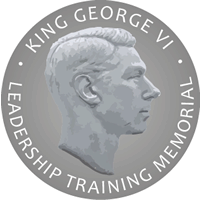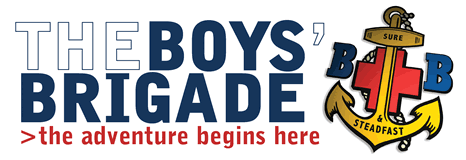The Boys' Brigade
The Boys’ Brigade is a volunteer led, uniformed youth organisation, which provides voluntary youth work to any branch of the Christian Church. The organisation was founded by Sir William Smith in Glasgow on 4th October 1883. For 129 years it has provided a safe environment where children and young people can develop into Successful Learners, Confident Individuals, Responsible Citizens and Effective Contributors.
KGVI Youth Leadership Training
The KGVI Youth Leadership Training Course is a programme of learning for young people, aged between 17 and 22, wishing to become Leaders in the Boys' Brigade comprising 2 one-week residential courses.
The purpose of the course is to highlight ways in which voluntary organisations operate and the steps they take to achieve their objectives. This will be achieved through combining practical and theoretical aspects of learning through the use of real-life contexts. The skills, knowledge and understanding gained are embedded in current youth work practice and theory, and reflect the integrated nature of organisations, their functions, and their decision-making processes.
Learners will be able to understand and make use of a range of leadership and life skills in a variety of contexts. The course therefore includes the study of voluntary work in the third sector.
The course explores the important impact volunteers have on everyday life, and therefore gives learners experiences which are topical. It develops skills for learning, life and work that will be of instant use when working with children and young people.
Learners will be given the opportunity to be involved in activities which are challenging, motivating and inspiring.
Programme Content
The Course is delivered in two parts, 12 months apart. During the year, learners are returned to their home location, putting the skills into practice on a supervised basis.
In year one, the course comprises three units:
Unit 1 – Leadership, Communication and Relationships (i)
The main theme of the training is the building and maintaining of trusting relationships with children and young people. Through participation in a number of modules, learners will develop the skills and knowledge needed to work effectively with young people, whilst allowing them to identify and further develop their existing skills
Unit 2 – Youth Leader Training
A series of generic core modules that concentrate on the values and methods of Christian Youth Work. National Occupation Standards for Youth Work have been adopted in the design of the modules, which cater for those working with the over 11 age group and the National Occupational Standards for Play Work, for those working with the under 11’s
Unit 3 – BB Programme (i)
This unit contains a number of training modules designed to communicate how to plan and carry out the activities that create a valuable and enjoyable experience for children and young people who come along to The Boys’ Brigade.
In year two, the course comprises two units:
Unit 1 – Leadership, Communication and Relationships (ii)
This unit contains a number of practical activities designed to allow the learners to demonstrate their grasp of the knowledge and skills picked up from the Part 1 and during the intervening year.
Unit 3 – BB Programme (ii)
Similar to unit 1 learners will demonstrate the knowledge and skills through a number of practical activities. There will also be an opportunity for learners to participate in additional taught sessions, leading to additional BB qualifications.

